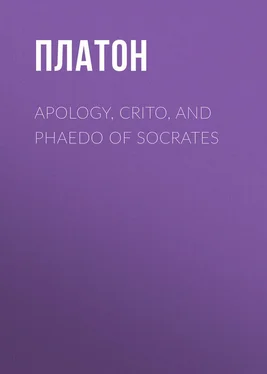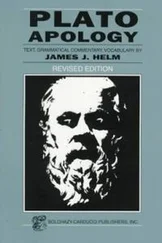Платон - Apology, Crito, and Phaedo of Socrates
Здесь есть возможность читать онлайн «Платон - Apology, Crito, and Phaedo of Socrates» — ознакомительный отрывок электронной книги совершенно бесплатно, а после прочтения отрывка купить полную версию. В некоторых случаях можно слушать аудио, скачать через торрент в формате fb2 и присутствует краткое содержание. Жанр: Философия, foreign_antique, foreign_prose, на английском языке. Описание произведения, (предисловие) а так же отзывы посетителей доступны на портале библиотеки ЛибКат.
- Название:Apology, Crito, and Phaedo of Socrates
- Автор:
- Жанр:
- Год:неизвестен
- ISBN:нет данных
- Рейтинг книги:4 / 5. Голосов: 1
-
Избранное:Добавить в избранное
- Отзывы:
-
Ваша оценка:
- 80
- 1
- 2
- 3
- 4
- 5
Apology, Crito, and Phaedo of Socrates: краткое содержание, описание и аннотация
Предлагаем к чтению аннотацию, описание, краткое содержание или предисловие (зависит от того, что написал сам автор книги «Apology, Crito, and Phaedo of Socrates»). Если вы не нашли необходимую информацию о книге — напишите в комментариях, мы постараемся отыскать её.
Apology, Crito, and Phaedo of Socrates — читать онлайн ознакомительный отрывок
Ниже представлен текст книги, разбитый по страницам. Система сохранения места последней прочитанной страницы, позволяет с удобством читать онлайн бесплатно книгу «Apology, Crito, and Phaedo of Socrates», без необходимости каждый раз заново искать на чём Вы остановились. Поставьте закладку, и сможете в любой момент перейти на страницу, на которой закончили чтение.
Интервал:
Закладка:
6. Consider, then, why I mention these things: it is because I am going to show you whence the calumny against me arose. For when I heard this, I reasoned thus with myself, What does the god mean? What enigma is this? For I am not conscious to myself that I am wise, either much or little. What, then, does he mean by saying that I am the wisest? For assuredly he does not speak falsely: that he could not do. And for a long time I was in doubt what he meant; afterward, with considerable difficulty, I had recourse to the following method of searching out his meaning. I went to one of those who have the character of being wise, thinking that there, if anywhere, I should confute the oracle, and show in answer to the response that This man is wiser than I, though you affirmed that I was the wisest. Having, then, examined this man (for there is no occasion to mention his name; he was, however, one of our great politicians, in examining whom I felt as I proceed to describe, O Athenians!), having fallen into conversation with him, this man appeared to be wise in the opinion of most other men, and especially in his own opinion, though in fact he was not so. I thereupon endeavored to show him that he fancied himself to be wise, but really was not. Hence I became odious, both to him and to many others who were present. When I left him, I reasoned thus with myself: I am wiser than this man, for neither of us appears to know anything great and good; but he fancies he knows something, although he knows nothing; whereas I, as I do not know anything, so I do not fancy I do. In this trifling particular, then, I appear to be wiser than he, because I do not fancy I know what I do not know. After that I went to another who was thought to be wiser than the former, and formed the very same opinion. Hence I became odious to him and to many others.
7. After this I went to others in turn, perceiving indeed, and grieving and alarmed, that I was making myself odious; however, it appeared necessary to regard the oracle of the god as of the greatest moment, and that, in order to discover its meaning, I must go to all who had the reputation of possessing any knowledge. And by the dog, O Athenians! for I must tell you the truth, I came to some such conclusion as this: those who bore the highest reputation appeared to me to be most deficient, in my researches in obedience to the god, and others who were considered inferior more nearly approaching to the possession of understanding. But I must relate to you my wandering, and the labors which I underwent, in order that the oracle might prove incontrovertible. For after the politicians I went to the poets, as well the tragic as the dithyrambic and others, expecting that here I should in very fact find myself more ignorant than they. Taking up, therefore, some of their poems, which appeared to me most elaborately finished, I questioned them as to their meaning, that at the same time I might learn something from them. I am ashamed, O Athenians! to tell you the truth; however, it must be told. For, in a word, almost all who were present could have given a better account of them than those by whom they had been composed. I soon discovered this, therefore, with regard to the poets, that they do not effect their object by wisdom, but by a certain natural inspiration, and under the influence of enthusiasm, like prophets and seers; for these also say many fine things, but they understand nothing that they say. The poets appeared to me to be affected in a similar manner; and at the same time I perceived that they considered themselves, on account of their poetry, to be the wisest of men in other things, in which they were not. I left them, therefore, under the persuasion that I was superior to them, in the same way that I was to the politicians.
8. At last, therefore, I went to the artisans. For I was conscious to myself that I knew scarcely anything, but I was sure that I should find them possessed of much beautiful knowledge. And in this I was not deceived; for they knew things which I did not, and in this respect they were wiser than I. But, O Athenians! even the best workmen appeared to me to have fallen into the same error as the poets; for each, because he excelled in the practice of his art, thought that he was very wise in other most important matters, and this mistake of theirs obscured the wisdom that they really possessed. I therefore asked myself, in behalf of the oracle, whether I should prefer to continue as I am, possessing none, either of their wisdom or their ignorance, or to have both as they have. I answered, therefore, to myself and to the oracle, that it was better for me to continue as I am.
9. From this investigation, then, O Athenians! many enmities have arisen against me, and those the most grievous and severe, so that many calumnies have sprung from them, and among them this appellation of being wise; for those who are from time to time present think that I am wise in those things, with respect to which I expose the ignorance of others. The god, however, O Athenians! appears to be really wise, and to mean this by his oracle: that human wisdom is worth little or nothing; and it is clear that he did not say this to Socrates, but made use of my name, putting me forward as an example, as if he had said, that man is the wisest among you, who, like Socrates, knows that he is in reality worth nothing with respect to wisdom. Still, therefore, I go about and search and inquire into these things, in obedience to the god, both among citizens and strangers, if I think any one of them is wise; and when he appears to me not to be so, I take the part of the god, and show that he is not wise. And, in consequence of this occupation, I have no leisure to attend in any considerable degree to the affairs of the state or my own; but I am in the greatest poverty through my devotion to the service of the god.
10. In addition to this, young men, who have much leisure and belong to the wealthiest families, following me of their own accord, take great delight in hearing men put to the test, and often imitate me, and themselves attempt to put others to the test; and then, I think, they find a great abundance of men who fancy they know something, although they know little or nothing. Hence those who are put to the test by them are angry with me, and not with them, and say that "there is one Socrates, a most pestilent fellow, who corrupts the youth." And when any one asks them by doing or teaching what, they have nothing to say, for they do not know; but, that they may not seem to be at a loss, they say such things as are ready at hand against all philosophers; "that he searches into things in heaven and things under the earth, that he does not believe there are gods, and that he makes the worse appear the better reason." For they would not, I think, be willing to tell the truth that they have been detected in pretending to possess knowledge, whereas they know nothing. Therefore, I think, being ambitions and vehement and numerous, and speaking systematically and persuasively about me, they have filled your ears, for a long time and diligently calumniating me. From among these, Melitus, Anytus and Lycon have attacked me; Melitus being angry on account of the poets, Anytus on account of the artisans and politicians, and Lycon on account of the rhetoricians. So that, as I said in the beginning, I should wonder if I were able in so short a time to remove from your minds a calumny that has prevailed so long. This, O Athenians! is the truth; and I speak it without concealing or disguising anything from you, much or little; though I very well know that by so doing I shall expose myself to odium. This, however, is a proof that I speak the truth, and that this is the nature of the calumny against me, and that these are its causes. And if you will investigate the matter, either now or hereafter, you will find it to be so.
11. With respect, then, to the charges which my first accusers have alleged against me, let this be a sufficient apology to you. To Melitus, that good and patriotic man, as he says, and to my later accusers, I will next endeavor to give an answer; and here, again, as there are different accusers, let us take up their deposition. It is pretty much as follows: "Socrates," it says, "acts unjustly in corrupting the youth, and in not believing in those gods in whom the city believes, but in other strange divinities." Such is the accusation; let us examine each particular of it. It says that I act unjustly in corrupting the youth. But I, O Athenians! say that Melitus acts unjustly, because he jests on serious subjects, rashly putting men upon trial, under pretense of being zealous and solicitous about things in which he never at any time took any concern. But that this is the case I will endeavor to prove to you.
Читать дальшеИнтервал:
Закладка:
Похожие книги на «Apology, Crito, and Phaedo of Socrates»
Представляем Вашему вниманию похожие книги на «Apology, Crito, and Phaedo of Socrates» списком для выбора. Мы отобрали схожую по названию и смыслу литературу в надежде предоставить читателям больше вариантов отыскать новые, интересные, ещё непрочитанные произведения.
Обсуждение, отзывы о книге «Apology, Crito, and Phaedo of Socrates» и просто собственные мнения читателей. Оставьте ваши комментарии, напишите, что Вы думаете о произведении, его смысле или главных героях. Укажите что конкретно понравилось, а что нет, и почему Вы так считаете.












